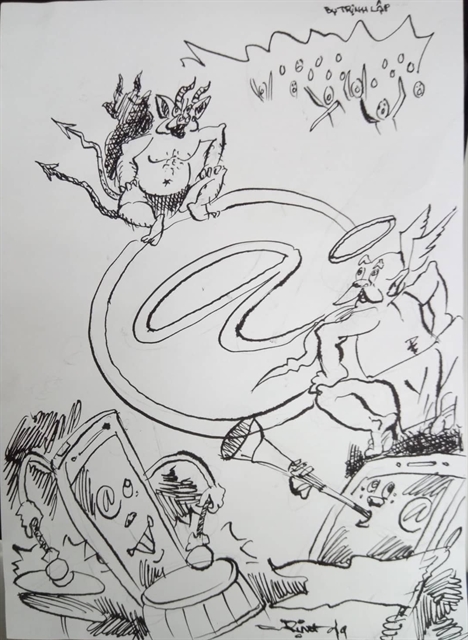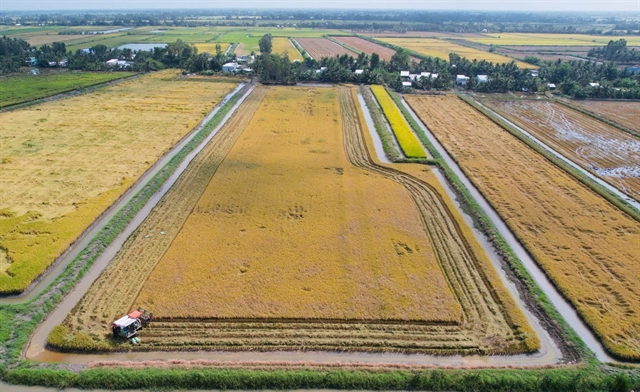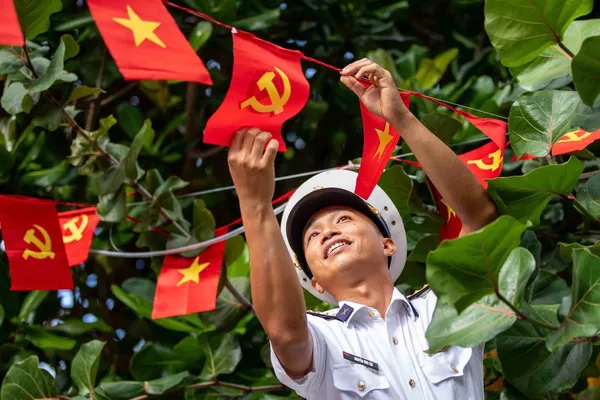 Talk Around Town
Talk Around Town
.jpg)

|
By An Phương
HCM CITY – Do unique hashtag campaigns or challenges, which take place across many social media platforms, result in something good or bad for society?
I bet we’ve all heard of at least one hashtag campaign or challenge before. Of the eight people I spoke with, all of them said they had seen at least one social post tagged with a hashtag or challenge every day.
“I often see one to two friends supporting a hashtag campaign or carrying out a random challenge on weekdays, and four to five people on weekends,” Thái Hưng, 28, told me.
“Recently, #Trashtag, #Livegreen #MeToo, #Momochallenge and #Kikichallenge have become increasingly popular,” he said.
“Of course, there are other ongoing viral hashtags, but social media usage, platforms, circles of friends, personal interests and online behaviour, among other factors, are what determine what we see,” Hưng added.
I agree with Hưng. Though #Momochallenge has gone viral across multiple social media platforms, I don’t see #Momochallenge-related posts appearing on my Facebook newsfeed.
“Same here,” Cao Minh, 25, a mutual friend of ours, said. “It was only when the challenge was reported on local newspapers that I became aware of its existence.”
Momo, described as a Whatsapp “suicide challenge”, purportedly features an avatar of a woman with dark hair, pale skin and oversized eyes, who sends young people images and instructions on how to harm themselves and others.
Though this challenge was later discovered to be a hoax and the phenomenon did not pose a serious threat to children, according to the National Society for the Prevention of Cruelty to Children (NSPCC), it panicked many vulnerable people, especially parents.
“This, together with the #Kikichallenge, disturbed me for days,” Minh said, adding that the substantial media recognition and coverage took him by surprise, considering how negative and superficial the messages were.
“The #Kikichallenge involves adrenaline-fueled youths dancing along a moving car, mimicking the opening line of Canadian rapper Drake’s hit single In My Feelings and showing it off on videos,” said Minh Anh, 21, Cao Minh’s younger sister.
“Though it seems fun, and I’ve actually seen many interesting videos, the senseless act of #Kikichallenge poses a number of potential dangerous acts, such as jumping from a moving vehicle, which carries a risk of being injured or even run over by the same car,” Minh Anh added.
Hưng said that he was not impressed with #Momochallenge or #Kikichallenge as they did not have any societal impact.
“To be honest, it’s the lyrics of the already-popular song In My Feelings that brought the challenge forward. The challenge itself might seem to be entertaining, yet it’s actually plain and awkward,” Hưng said.
“A hashtag campaign or challenge is meaningful only when it serves a specific purpose, including entertainment,” the four of us agreed.
As far as I know, hashtag campaigns or challenges were initially invented by brands to build brand awareness, shape brand recognition and encourage the creation of user-generated content.
Some significant examples that I can name right away are Coca-Cola’s #ShareACoke, ALS Association’s #IceBucketChallenge, and Calvin Klein’s #MyCalvins.
“#IceBucketChallenge was very popular six to seven years ago, I remember. A person is filmed as a bucket of water and ice is dumped over an individual’s head, right?” Cao Minh said.
“It was one of the first hashtag campaigns ever created that I found to be both fun and meaningful. It was designed to promote awareness of amyotrophic lateral sclerosis (ALS) and encourage donations for research,” said Hưng who made a small donation.
These days, I’ve noticed that hashtag campaigns and challenges have gone beyond advertising for a brand or association.
Indeed, they are made to support certain social movements, ones that society can really benefit from, such as #Metoo and #Trashtag.
“These two hashtags really do stand out from the rest!” Minh Anh said.
#Metoo is the hashtag campaign that encourages all women to share their personal stories of sexual assault and harassment at any level.
Even though I haven’t been a victim, this movement has equipped me with necessary knowledge on how to protect myself and not be afraid to speak up.
“I’m glad this movement has spread globally. It made me realise this matter is very real and that I would like to share my sympathy and support for all victims,” Minh Anh added.
While #Metoo took off in other countries, the hashtag #Trashtag began trending among Vietnamese youth whose photos and stories can be seen on all social media and local newspapers.
Instead of encouraging social media users to do something potentially dangerous, #Trashtag inspires people to go to sites covered in garbage, pick up the trash, then post before-and-after pictures of their cleanup on social media.
“As of March 26, there have been almost 50,000 posts tagged with #Trashtag on Instagram,” Minh Anh said, adding that she had joined her friends to clean up a trash site near Sài Gòn River last weekend.
“I will join my sister next week," Cao Minh said. “I don’t usually carry out any challenge, but #TrashTag’s substantial media coverage inspired me to live green. I feel like I should be a better steward of the environment!”
To be honest, it usually takes me a lot of thinking before accepting a challenge or joining a campaign, as it has to be easy to do and most importantly, hold specific societal value.
“Sometimes, a challenge can be easy, but if its impact can’t be predicted, we don’t want to waste our time,” Minh and Hưng agreed.
“I’m currently following the #Lessplastic challenge in which I’m trying to reduce the amount of plastic used every day,” Minh said. “So far, so good! I actually forced my close friends to join the movement with me, and they seemed to enjoy it, too!”
After having a discussion with my friends, I felt lucky living in the digital age as I’ve been able to experience what might be considered difficult during my parents’ time in Việt Nam – joining global social movements and being able to speak up to everyone connected to the internet across the globe.
Hashtag campaigns and challenges can bring both good and bad to society, but it’s up to us to decide to follow what is meaningful.
Having the privilege to live in the digital age, I encourage everyone to try at least one hashtag campaign or challenge.
I vote for #Lessplastic. What do you have in mind? VNS
.jpg)



